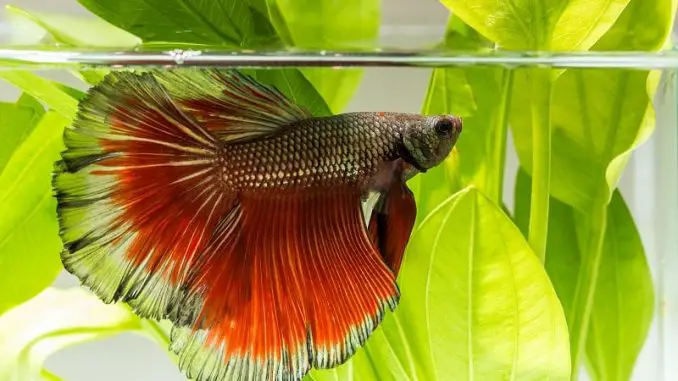
Yes, betta fish sleep. However, there is a lot more that you should know in order to take proper care of your fish.
If your fish are not getting the right amount of sleep, they will soon become ill and could die before too long.
By understanding your betta’s sleeping patterns, you can make sure that your aquarium is optimized for your betta to get a good night’s rest.
TABLE OF CONTENTS
Why Do Betta Fish Sleep?
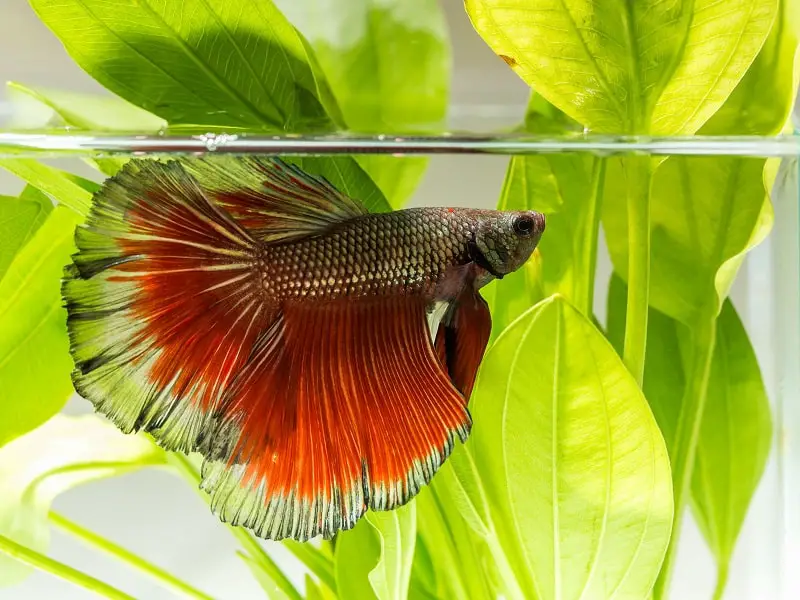
All fish sleep and bettas are no exception.
Sleep is important to fish for the same reasons that humans need it. It’s restorative; a time for the body to recharge and repair.
However, fish sleep in a different way to mammals. It’s more like resting in suspended animation. They reduce their activity and metabolism but maintain a level of alertness.
This means that they are able to react quickly to any danger, such as an approaching predator. It makes them light sleepers though, so be careful not to wake them as you move past the aquarium at night.
Even though they remain alert, most fish search for the added protection of shelter in rocks or corals before going to sleep.
Without this sleep, your betta’s behavior will start to change. They will become slow and sluggish and could start acting erratically.
A lack of sleep also leaves them weaker; their immune system will be less able to fight off diseases, increasing the likelihood of infection and death.
There is still a lot that we do not know about fish sleep, and research is ongoing about the role it plays in their lives. We still have many unanswered questions about our own sleeping patterns.
Are Betta Fish Nocturnal?
No, betta fish are not nocturnal.
A nocturnal fish is one that sleeps during the day and comes out at night in search of food. There are lots of nocturnal species in the aquarium hobby, but betta fish are not one of them.
Bettas are mostly active during the day and sleep at night, though they are known to take short rest during the daytime too.
They match their sleep cycle with the aquarium lighting, so maintaining a regular lighting schedule is important.
Many aquarists avoid nocturnal species to ensure that there is plenty of activity to be seen in their tank during the day. This makes a beautiful species like the betta fish an excellent option.
Do Betta Fish Hibernate?
No, betta fish do not hibernate.
Hibernation is useful for certain animals to survive cold winters. Bettas are from tropical freshwaters in Asia. They have no need to hibernate, as the water remains warm.
If you think that your betta has become less active during the winter, check the temperature of the water. If it isn’t as warm as it should be, your Betta’s inactivity is likely due to temperature shock.
Temperature shock can be dangerous, for you can save your fish by simply heating the tank back to the optimum level.
How Do Betta Fish Sleep?
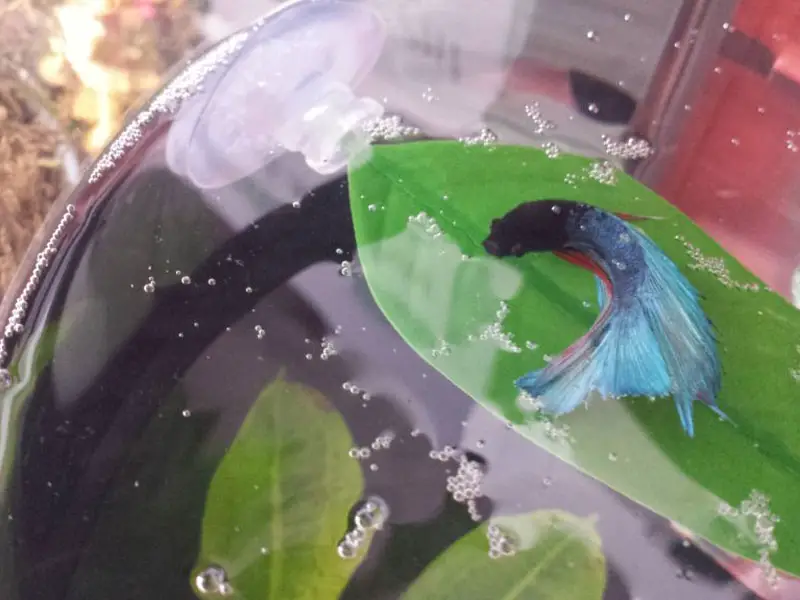
Betta fish hide away somewhere to sleep, remaining motionless until they are refreshed or disturbed.
Not all fish can do this. Some must keep swimming constantly to breathe, like certain sharks and tuna. It is thought that these fish only rest half of their brains at a time as dolphins do.
Bettas can sleep anywhere. Usually, they will be wedged between decorations or hidden in a cave to give them an extra sense of security, but sometimes they could even just be floating in the water.
They won’t necessarily stick to the same place. One night they might be hidden behind the heater and another they could be floating among some plants.
Don’t assume that they are dead if you see them somewhere strange.
They could be resting in any position, even some that look quite uncomfortable, like vertically with their head on the substrate, or with their fins opened out.
Their eyes will still be open while they sleep since they do not possess eyelids.
You may notice that your betta loses some of its colors while they sleep. This is a form of self-defense. It makes them less noticeable to predators nearby. Their color should gradually return once they wake up.
Is Your Betta Fish Sleeping or Dead?
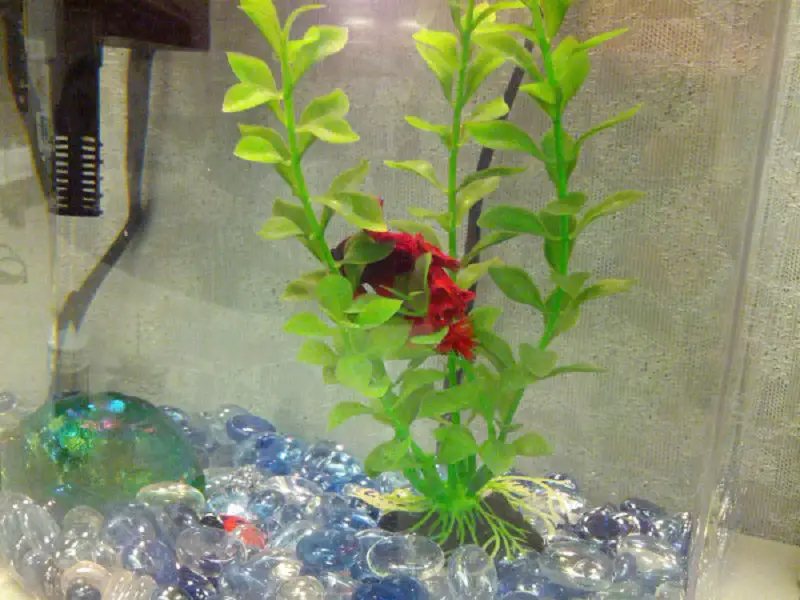
This is a simple thing to check. Though your betta is resting its body, it still needs to breathe, so you can look for signs of breathing to check that it is still alive.
They will be drawing water in through their mouths to pass it over their gills and extract oxygen. You should see a regular rhythm of movement in these areas.
Be aware that the mouth and gill movement will be slower while they are asleep compared to when they are awake and active.
Fish Out of Water
If you have large leaves at the surface of the water or anything else that can create a similar platform, then you may come across a strange situation one day.
Your betta might be sleeping on top of these surfaces, out of the water.
This can be a shock when you see it. It makes more sense when you find out that betta fish can actually breathe air like us.
Along with several other species of fish, bettas have something called a labyrinth organ which can extract oxygen from the air, whereas gills can only take oxygen from water.
They cannot do this for too long at a time though; they must remain moist. The labyrinth organ is primarily used to allow bettas to survive in low oxygen environments in the wild.
Is Your Betta Sleeping the Right Amount?
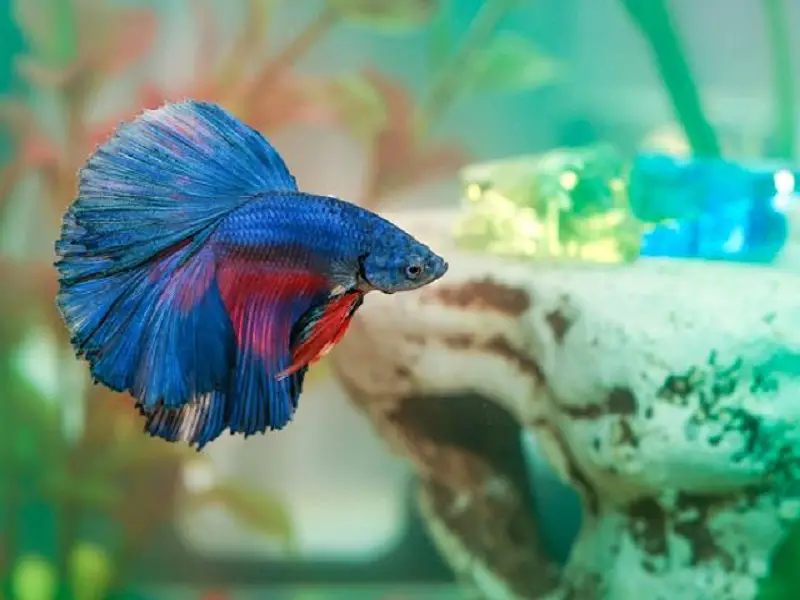
In order to stay healthy, a betta should be sleeping for around 12-14 hours each day. The vast majority of this will occur at night but don’t be surprised if they take a few naps through the day.
If they’re not getting the right amount of sleep, there is probably a cause. Below are a few suggestions to explain why your betta might be sleeping too much or too little.
Sleeping Too Much?
Low lighting could be a cause, either by dim lighting or leaving them off for too long. Bettas arrange their sleeping regime based on the light in the aquarium, sleeping at night, and being active during the day.
Therefore, if your tank is too dark it will seem like it is night all the time. They won’t sleep forever, but it could add hours to the amount they sleep each day.
A boring tank could also lead to extra sleep.
You must not forget that Bettas are more than just a decoration, they are living creatures that should be kept in an engaging aquarium that meets all of their needs.
A small tank can lead to boredom. If there’s nowhere for them to swim, then sleeping becomes an attractive pastime.
To add interest to the tank for your Betta Fish, you could add a small mirror to occupy them. Another option is to regularly change or move around the aquarium decorations.
If the water temperature deviates from the norm, it could make them sleepier. They operate best when your aquarium heater is set within their preferred range of 78°F to 82°F.
The larger the deviation in temperature, the greater the effect. It could lead to the death of your fish if the problem is not sorted, so check this parameter regularly.
Unfortunately, too much sleep is often due to your betta becoming ill. Fatigue is a symptom of many common freshwater diseases, which results in your fish resting more of the time.
Some diseases affect a betta’s buoyancy or make it difficult to swim, so they are often found at the surface or on the substrate.
If disease is the problem, you should be able to spot some other symptoms. Some of the most obvious diseases include ich, fin rot, and hole in the head disease.
One health problem is unavoidable: old age. Bettas have a lifespan of around 5 years, and they will likely start resting more as time passes.
Sleeping Too Little?
Usually, if there is an issue it’s because a fish is sleeping too much, but some bettas do not get enough sleep.
Lighting can cause a lack of sleep just like it can lead to too much sleep. If you leave your lights on for too long, it will make your Betta think that it is still daytime, so they won’t hide away to sleep.
Tank mates could be another problem. Compatibility issues will result in harassment or fighting. This will stress your betta and keep them awake.
This is made worse by betta’s territorial nature. If there is any threat to their territory, then they will make sure they are around to defend it.
A disease might reduce the amount of sleep a fish gets. Some can leave them in distress, making it difficult for them to relax.
How Can You Help Your Betta Fish Sleep?
There are a few things you can do to give your betta the best chance of getting a good night’s sleep (plus a few naps). This is necessary for keeping them as happy and healthy as possible.
Perhaps the most important thing you can do is maintain a strict lighting schedule. Bettas need a regular light cycle to mimic the day-night cycle, so they know when they should be sleeping.
Try to turn the lights on and off at the same time every day. You can purchase an aquarium timer that will do this for you automatically
You don’t need to leave your lights on for too long. About 8 hours of light is enough; this should be enough time for any live plants you keep to photosynthesize as well.
Leaving lights on for much longer than this will keep your betta awake into the night and promote algal growth.
Even when the lights are on, your betta might still want to nap. They won’t want to do this in direct light, so you need to give them caves or shaded areas to sleep in.
These are easy to create with decorations or plants when you are designing your aquarium. Add a few suitable areas to give them a choice.
Another thing to think about when designing the tank is whether there is enough to keep them occupied.
If the tank is too small, they will have nowhere to explore so they will get bored. Use decorations to break up sightlines. You could even add a mirror so they can admire themselves.
Consider tank mates carefully as well. Avoid compatibility issues so that your betta is not stressed to the point of having to stay awake.
The last thing you can do is keep the aquarium in good general health. Clean the tank regularly and use a water testing kit and a thermometer each week to make sure the environment is how it should be.
This will help to keep diseases at bay and avoid any temperature-related drowsiness.
Conclusion
Sleep is as important to your betta as it is to us. It helps them to recharge, repair, and stay strong. Without it, your fish would soon become fatigued and ill, leading to its death.
You should now know how to spot if your betta is sleeping. Do not be surprised if you see them floating in the water or sitting on something out of the water.
Take note if you think your fish is sleeping too much or too little, as there is plenty that you can do to help them.
This could be as simple as moving some decorations around once in a while, or it could be creating a new strict lighting routine.
Your betta will appreciate the effort that you put in. Everyone loves the a good night’s sleep.
How does your Betta Fish like to sleep? Let us know in the comments below…



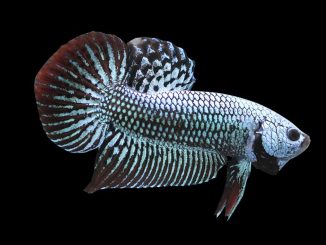
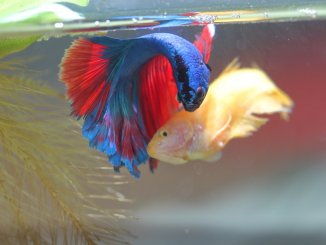
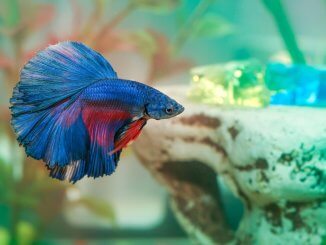
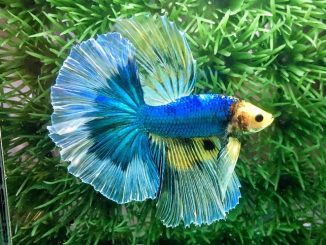

Be the first to comment